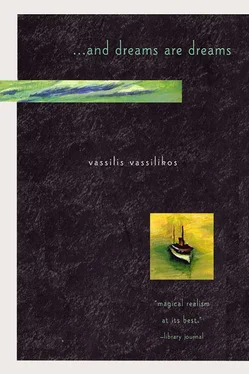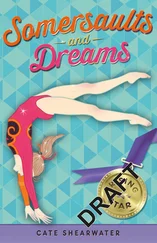“But how did it happen?” he kept asking her.
“Tell me, how exactly did it happen?”
“What’s certain is that it wasn’t my fault,” replied Doña Rosita. “I was going home, it was ten o’clock at night and there was a light rain falling, when at the crossroads of Hypoxinou Street and Mesoghion Avenue, where the traffic light has never worked, I saw two cars come up the side street and stop. I flashed my lights to signal to them that I would keep on moving since I had the right-of-way, but I slowed down just to be on the safe side. I don’t know what they were thinking, but even though they were at a standstill when I entered the intersection, suddenly they both took off and crashed into me. You know the rest.”
She was still dizzy, she said, and she ached all over. It was a miracle she had survived; of that she was convinced. It had been quite a crash. Hadn’t he seen her car downstairs? Visibly shaken, Don Pacifico went downstairs immediately to look at the car and estimate, by the damage, how severe the crash had been. The body of the car had indeed been hit in two places. He came back to his darling and lay down next to her. He caressed her tenderly to assuage yesterday’s pain.
“Where were you last night around ten o’clock?”
she asked, her voice weak and not at all reproachful.
“I had business to take care of with the
contractor,” he said.
That reassured her. Then, she told him that what had sustained her through her pain and abandonment were the three Holy Virgins, the three monasteries; in other words, the three excursions they had taken together a few days earlier.
It was a grey day. The central heating came on only in the evening and early in the morning, so it was cold in the room. They turned on the electric radiator that emitted, besides its heat, a honey-colored light. In the apartment next door, someone was trying to play the piano. But he was too much of a novice to give them the pleasure of a melody, even by a fluke. Then they dove into silence, a silence full of secret messages.
Don Pacifico couldn’t get over the thought that his darling could have been killed or irrevocably mutilated. That was what angered him: the injustice inherent in life itself, whereby it can be interrupted without any warning, without any ceremony. It’s only when you expect it to be that it isn’t interrupted. And he started weighing all those cases of people who hadn’t been given long to live and yet, fortunately, lived for many years, against those who were given no warning of their sudden end, and he concluded that the latter cases numbered more than the former. Life is a sweet self-delusion, he thought to himself. That’s why there’s no point in fretting and worrying. Life is a miracle that is given to us each morning, and it is a foolish person who does not enjoy it for the miracle it is, but who instead is moody, irritable, and unpleasant.
“I love you,” he whispered to her tenderly, and they lay there together in bed, without making love, for the first time in their burning relationship. The flowers in the vases sighed with relief.
“So, to recapitulate,” said Lieutenant Livreas, and began reading her statement to her, in his own words, using police terms. Only he still kept forgetting that intersection: Hypoxinou Street and Mesoghion Avenue. Inside his office at the Athens Traffic Police, the smell of bear still lingered. But maybe it was the smell of the gypsy, thought Doña Rosita, who was feeling a little faint, and she took out of her purse not her scented handkerchief, but that lemon with her nail marks in it, that still, after all those days, smelled sweet.
— 1-
The failure of the other two notebooks, the other two stories, brought me inevitably to this third notebook, whose unlined pages mean that the narrator (that is, I) has to find on his own the imaginary line that will lead him inevitably to the station he desires.
By that I mean that the lines should lead you like rails to a terminus. Indeed, the narrative journey has a beginning and an end with intermediate stops. But a page without lines might go off in any number of directions. The story might go this way, or it might go the other. But which are the stories I wanted to tell and never managed to? And what should I tell first? The stories themselves, or the story of their failure? Don’t those two things add up to a single story? Aren’t they both writings, texts? Therefore, in order to avoid any misunderstandings, doesn’t it take the same effort to say something as to explain why you can’t say it? You must think that I am joking. That I am quibbling. But no, that is not my intention at all. In order to be free of the stories I didn’t tell, I have to explain what it was that prevented me. For, I fear, I am repeating myself.
In the end, that too is a story.
— 2-
First let me introduce myself. Who am I? I am not young. I will conceal my age, not for vanity’s sake, but because I don’t think I should characterize myself. Let the reader — that mythical creature whom we all pursue and whom none of us has ever found, since in all likelihood our readers are simply our fellows: writers of stories like ourselves — let the reader say how old I am. No other particular traits are needed at the moment, other than that I live in a hotel and that in my small room I have a radio, a typewriter, and a few changes of clothes. I have come here, to this strange city, to write a novel commissioned by my publisher, about a man who lives with the heart of another. It’s about Don Pacifico, a man with heart trouble, who has received the transplanted heart of Doña Rosita, a woman who was killed in a car accident.
How does this man feel with the heart of this woman? I have gathered information from doctors; the novel will deal with the role the biological factor plays in a person’s psychology. Doña Rosita’s heart had definitely registered in its cells certain experiences or memories that pop up, every so often, in the postoperative behavior of Don Pacifico, causing him distress.
Also included will be the element of surprise, as well as humor; in short, a topical book, of which I have written quite a few (my last one about an AIDS patient was wildly successful), which is why my publisher, who goes whichever way the wind blows, but is a great guy, said: “Off you go, no time to waste, here’s the topic, here’s the material, go away and write. Have it back to me in a month.” That is how I found myself, within a few days, transplanted here in this strange city, in this small room where I don’t know what’s come over me except that I can’t concentrate. I write and I erase, a thing I have never done before. I just can’t get into my story.
So I decided to tell another story, to get myself warmed up, the same way a composer writes an overture so that all the instruments tie in with each other, before he proceeds to the symphonic poem. In fact, I didn’t have a shred of a story: someone (the hero) goes to visit a friend, a fisherman, in Crete, during the holiday of the Assumption in mid-August.
The fisherman has just added one more floor to his ancestral home to rent as lodgings for tourists. He works with a Scandinavian travel agency. One day, he’s left with a woman from a Norwegian group who has fallen ill. She is blond and beautiful, like a Nordic goddess. The summer goes by and the patient remains bedridden, unable to get well. The neighbors take her under their wings. The irascible, unapproachable seaman begins little by little to fall in love with her.
They get married. They have two children. The mother of the blond goddess sends her everything she needs from Norway. But the goddess remains a foreigner in the village. She does not adapt to the roughness of the sun, the rocks, and the people. The following year, in mid-August, the friend comes from Crete to visit.
Читать дальше












